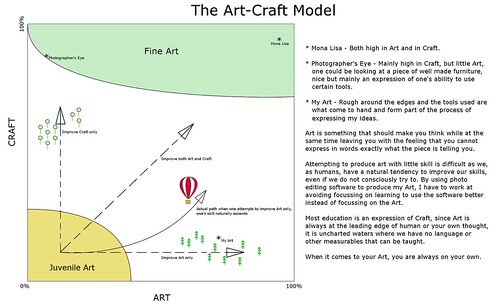After knocking the first model together for first art-craft blog, I realized that it was not quite right, it lacked somethings and was really too much like a graph in some text book. I mean, I wanted it to look like something from a text book because i feel that this would appeal to the kind of people who read technical data and are put off by the art world, and yet I also wanted it to appeal to the art world too, as my intention is to try and bridge that artificial gap between art and crafts, art and science, real and unreal. I wanted a map.
The first bit to go under the knife was the area called 'fine art', which I trimmed off on the left hand side to make it easier to exclude some things, like high-quality, machine made furniture that few people would call art. I had to be careful since there is an idea that factory made articles are somehow poorer quality craft than hand made - ignoring the basic precept that everything automated machinery produces is produced by machines designed and set up by humans - and nothing that we humans do is without at least a tiny bit of Art, since it is Art that makes us more than mere responders-to-stimuli, like a toothbrush is.
Seeing as I had a whacking great lump of fine art, I realised that something was needed to mark where we all come from, those first attempts to make an impression on the world when we are but newly born. You cannot hold a spoon or stand on your own feet, and yet those craft skills are gained within a few short years. Your abstract thought is able to express base emotions, and yet how long before you can express fine divisions in these emotions, or to conceal them? Hence, the graph now has a large 'juvenile' area, where often we start when we move into a new area.
Interestingly enough, once you have accepted that Art is within you and independent of subject, and if you can improve that Art to a sufficient level, then moving into a new subject area does not mean you start in the juvenile area, but to the right of it. This means you can start producing quality work in that field, even if your craft skills are very poor. Annoying as it may be to those with high craft skills, your opinion in a new field based on a high level of Art can be very valid.
Finding your way through to the high areas of Art, on the right hand side of the graph, is treacherous as it is wild and unmapped territory, where few people can help you as first you have to let them into your head to learn how you think - and, of course, that also means you will not progress far in the search for your Art if you spend too little time in your own head, finding out how and why it works.
In comparison, learning skill is relatively easy because the world is full of experts, your only real limitation, other than access to the right expert, the tools required and adequate time, is your own potential ability. The training path is clear, easy to follow, even as it takes you into strange lands. You can almost always check your progress on the map of exams and peer opinion.
I have added a new line to the graphy bit, to show how easy it is to float off in the direction of Craft achievement while trying to improve the Art. If you pursue Craft, it is easy to shift focus from the innovation phase to a process one - where once you have achieved some Art, you then continue to refine your presentation of that Art (process) rather than continue to explore the potential of your Art (innovation).
if you ever wonder whether you show much Art in your highly skilled work, or whether you are producing work equivalent to the 'Photographer's Eye', then you need to abandon all your fine tools and find the most basic implements you can and then see what you can produce with them. Do the resulting pieces have any value? This will force you to use your tools to their full potential, and you will be conscious of their limit. To get beyond that limit requires the use of Art.
Now that you have recent experience of inferior tools, now try to do something in an alien field, one in which you neither have the skill nor the tools. If you have never cooked, cook on a camping stove. If you have never been a teacher, try teaching someone in a basic environment. You will probably find yourself desperately looking for books or internet sites to read, not because you need that information but because Craft skills and the knowledge that underlies it have become your prop - your confidence has become intertwinned with learned process instead of raw innovation - your Art.
Finally, Art really is only in your head, what you produce are works of Art, not the Art itself, that remains in your head. If you ever find a finely worked flint arrow head dating back to prehistoric times, it is like a glimpse into someone else's mind, into their Art, as well as being an example of their skill.
Friday, December 12, 2008
Subscribe to:
Post Comments (Atom)

No comments:
Post a Comment